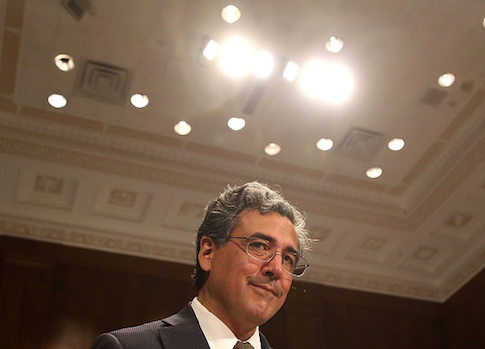Trump Admin Throws Weight Behind Union Challenge
Brief argues that government unions are inherently politica
Solicitor General Noel Francisco / Getty ImagesBY:
The Trump administration could bolster an Illinois state workers' lawsuit to end coercive unionism, according to legal experts.
The Solicitor General's office filed a brief supporting Janus v. American Federation of State, County, and Municipal Employees (AFSCME), a lawsuit challenging coercive unionism for government workers. The suit argues that the Supreme Court's 1977 Abood decision violates the speech and association rights of workers by allowing government agencies to mandate union dues or fees as a condition of employment. The amicus brief from the Justice Department bolsters that argument.
"Abood thus ultimately endorsed precisely what it simultaneously prohibited: compelled subsidization of union speech for political or ideological causes," the brief says.
The U.S. government has previously defended Abood before the court, arguing that it was necessary to preserve workplace harmony. The Trump administration is breaking from the federal government's traditional position by making the case that all public sector collective bargaining equates to political speech, since wages and benefits affect the way state and local governments, as well as federal agencies, budget and set political priorities.
The payment of union fees violates the speech rights of public employees by forcing them to contribute to inherently political negotiations.
"In the public sector, speech in collective bargaining is necessarily speech about public issues. Virtually every matter at stake in a public-sector labor agreement affects the public fisc, and therefore is a matter of public policy concerning all citizens," the brief says. "To compel a public employee to subsidize his union’s bargaining position on these questions is to force him to support private political and ideological viewpoints with which he may strongly disagree."
The support of the federal government could bolster the plaintiffs' case, according to labor lawyers. The brief opens the door for Solicitor General Noel Francisco to participate in oral arguments before the Court. Todd Lyon, a management-side attorney at Fisher Phillips, said it would "add value to the overall argument."
"My instinct is that the solicitor general is granted that oral argument whenever they are involved in a case," he told the Washington Free Beacon. "Having the weight of the federal government supporting the position of the plaintiffs would add quite a bit of value."
David Phippen, an attorney at Constangy, Brooks, Smith & Prophete, said he does not ultimately see the amicus brief holding too much sway over the how the justices decide the case. He said the strength of the brief, however, could make a difference "on the margins," praising the argument advanced by the department.
"It was a very succinct and good argument that did not overreach. All things being equal, it's helpful," he said. "I think the justices are going to fairly evaluate the case as they see fit, but on the margins having the solicitor general go in can only help—mostly because he [Francisco] is a very good lawyer."
Janus is the latest challenge to public sector unionism. California teacher Rebecca Friedrichs took her agency fee case all the way to the Supreme Court in 2016. The high court deadlocked on the case 4-4 following the unexpected death of Justice Antonin Scalia.

No comments:
Post a Comment